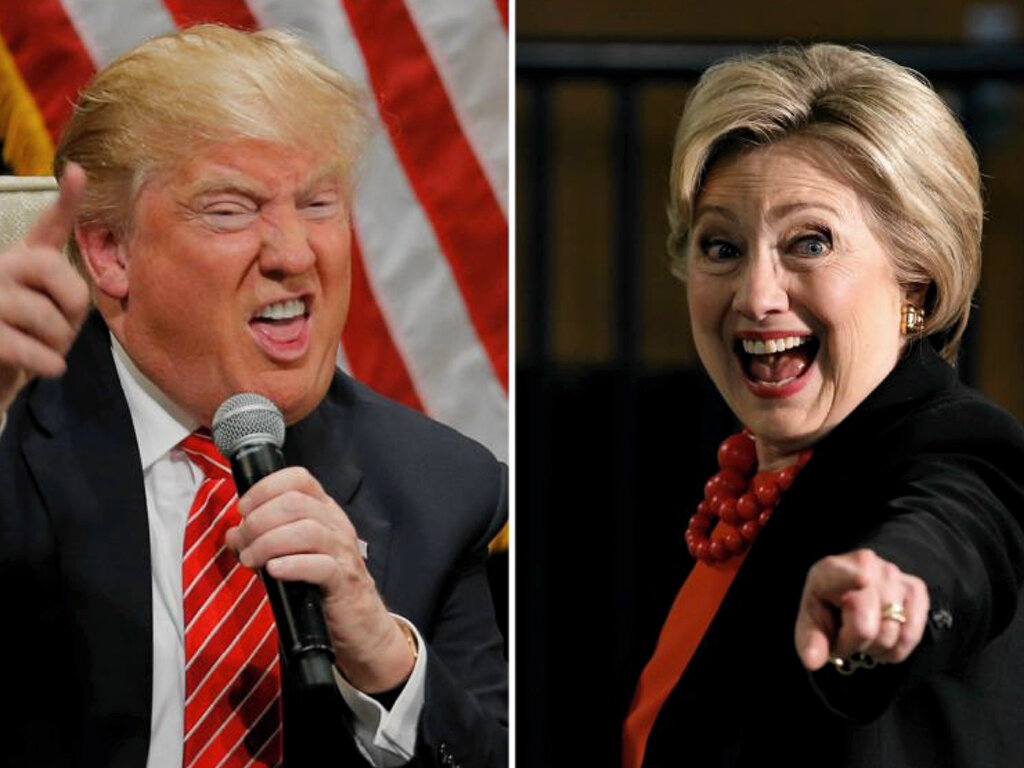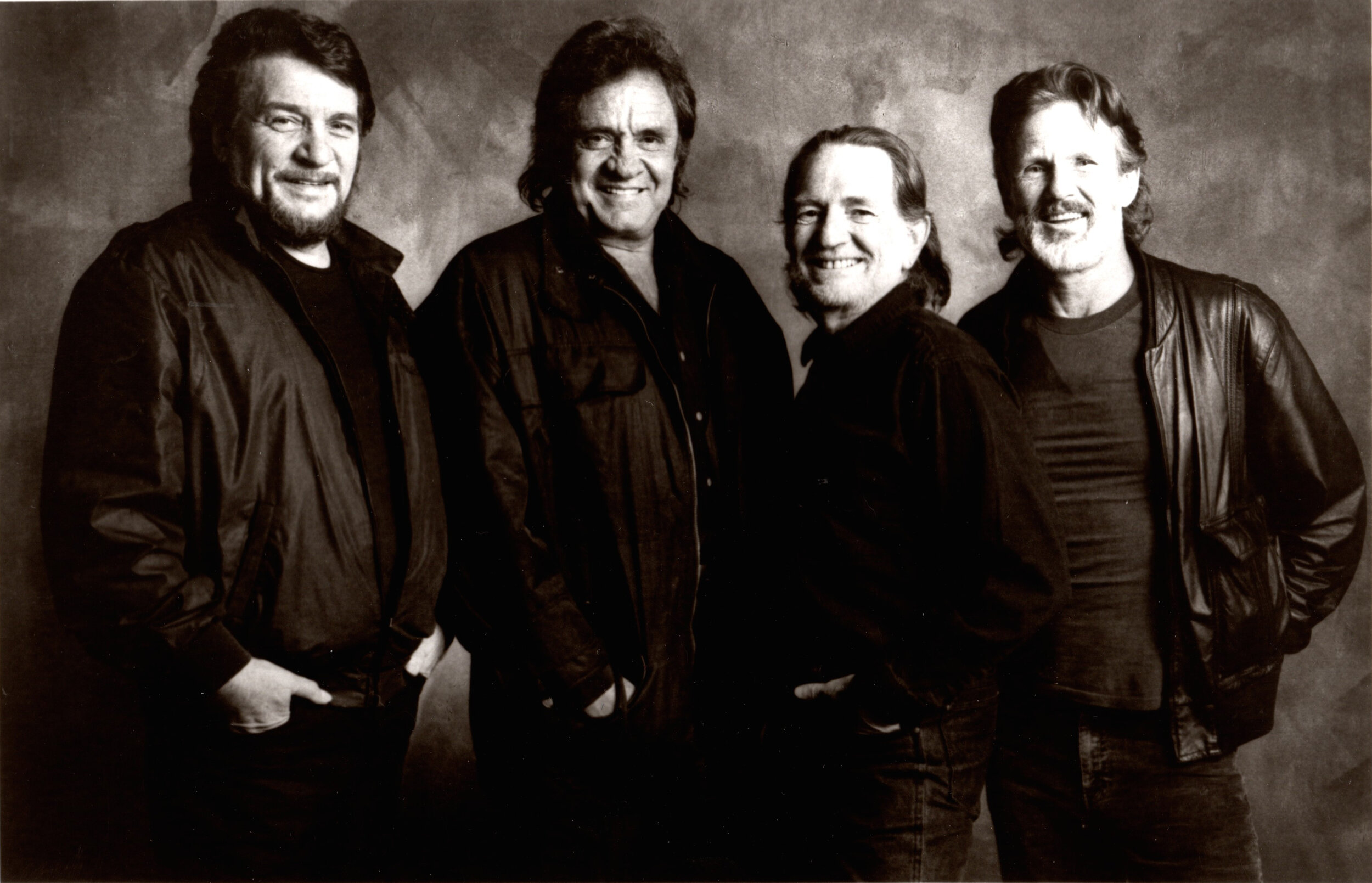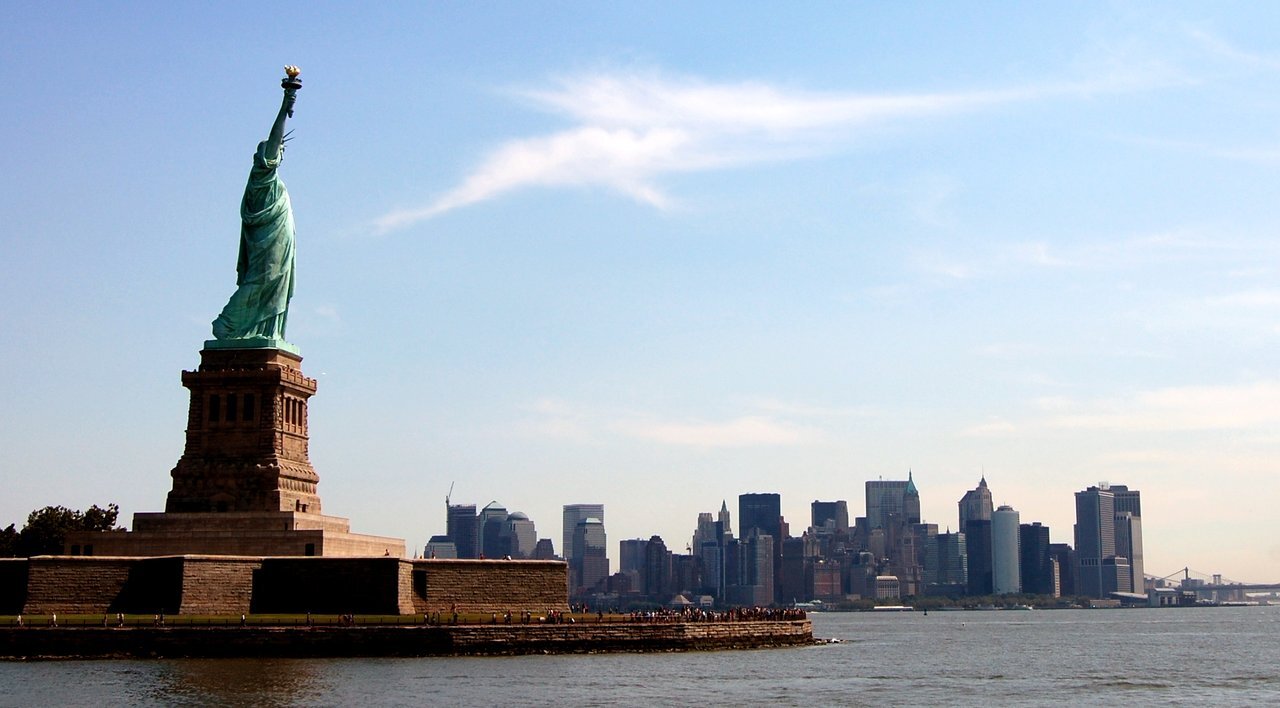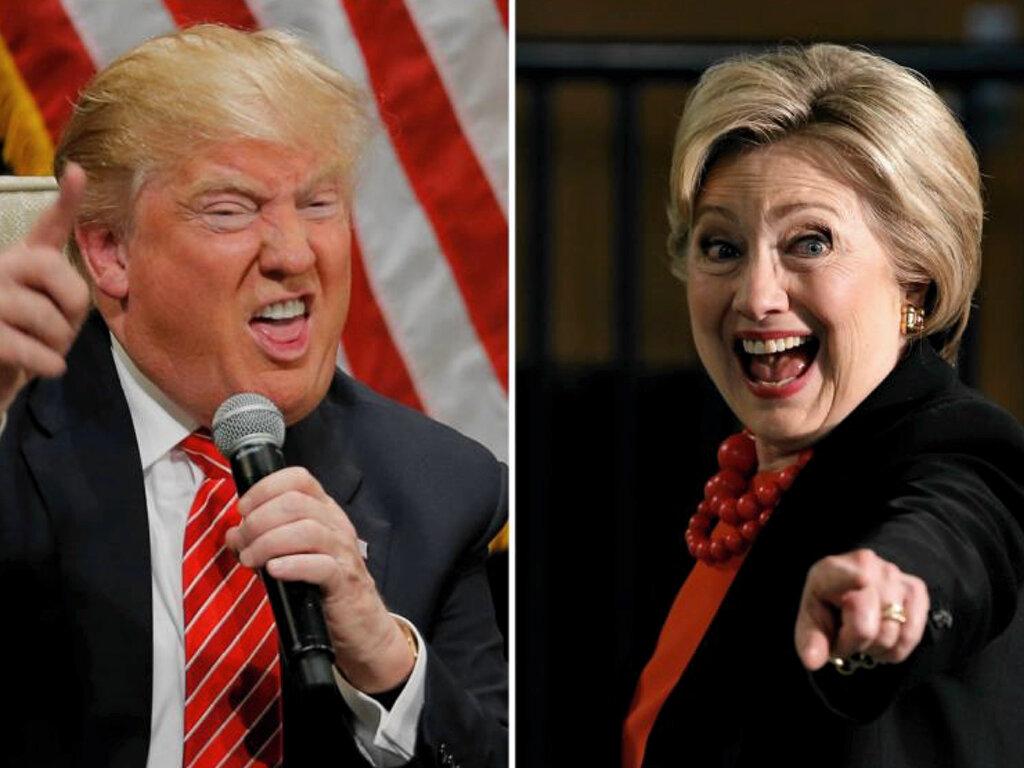Clinton v Trump at Midnight in the Garden of Good and Evil
 For some, the 2016 U.S. presidential choice of Clinton v Trump comes down to which plague is worse for the nation, but the news media downplays a more panoramic view.I began a Christmas post a few years ago with an urban legend that spread far and wide in the 1960s and early 1970s. It was widely rumored then that if you play AC/DC records backward you will hear Satanic messages. I never tried it, but I know it was only imagined, and never real. However, as ruefully wrote in that Christmas post, a very different phenomenon occurs if you play country music backward: your wife comes home, your dog comes back, and you suddenly remember where you left your truck.I spent so much of my young adult life disparaging the drama and despair of country music that as I grew older the disparagement became sort of a habit. I spent my forties and fifties in denial about how memorable some country classics are, and how easily they become stuck in my mind. Last night as I pondered what I might write today, I came across a PBS replay of a 1990 concert by The Highwaymen: Johnny Cash, Willie Nelson, Waylon Jennings, and Kris Kristopherson. For two solid hours, I was simply mesmerized by them and their music. Now, finally, I must admit publicly that something terrible has happened to me... well, something besides the obvious, anyway. I know not when or how it happened, but I am now a fan of blues and some country music.The two genres are related, though most “Northerners” don’t know that. They developed side by side in the rural U.S. south. The first country music recordings came from the 1920s from the folk music of early British settlers, and have been centered from the 1920s onward in Nashville, Tennessee. Blues arose just a decade before out of Memphis in 1912 with a mix of both African and local folk music. Today I understand that you have to live the blues before you can sing them, and the ballads of country endure the test of time, only when you accept that life is sometimes very hard.[video align="center" aspect_ratio="16:9" width="90" autoplay=“0”]https://www.youtube.com/watch?v=HxAa83gP9vc[/video]The evidence for that is playing relentlessly inside my mind even as I type. I was riveted to Johnny Cash’s “Folsom Prison Blues,” mostly, I think, because I’m living them. And that classic by The Highwaymen, “Freedom’s Just Another Word for Nothing Left to Lose” has just a hint of hard-earned cynicism and, from my perspective, a ring of truth.[video align="center" aspect_ratio="16:9" width="90" autoplay=“0”]https://www.youtube.com/watch?v=ahpIirW0svY[/video]I awoke this morning with Johnny Cash’s “Ring of Fire” stuck in my mind, and it just won’t quit. Perhaps there’s a simple ring of truth in that for me as well. I really did fall into a burning ring of fire. I really did go down, down, down as the flames went higher. I can come up with only one reason why these songs did not resonate with me thirty years ago. Life was easy then, and I could not foresee the armageddon to come.[video align="center" aspect_ratio="16:9" width="90" autoplay=“0”]https://www.youtube.com/watch?v=It7107ELQvY[/video]Over the last 24 hours, I found only one way to silence that great but relentless ballad, Johnny Cash’s “Ring of Fire.” With just a little concentration, the music player in my mind will switch over to Willie Nelson’s “Always on My Mind,” where it will play all day if I don’t switch back. It’s an amazing song of love, loss, and longing, recalling “the things I should have said and done,” the sort of reminiscing that comes to everyone, not from the sixties, but from turning 60.[video align="center" aspect_ratio="16:9" width="90" autoplay=“0”]https://www.youtube.com/watch?v=R7f189Z0v0Y[/video]In the world of music, there has never been anyone quite like Willie Nelson and Johnny Cash. In that 1990 concert, they sang a duet. I could not possibly have imagined such a thing, but it made my face hurt because I found myself smiling all the way through it. That’s another reality of Johnny’s “Folsom Prison Blues.” While you’re living in it, you just never find enough to smile about. I’m going to try to smile more. Let’s hope it doesn’t scare my friend, Max.
For some, the 2016 U.S. presidential choice of Clinton v Trump comes down to which plague is worse for the nation, but the news media downplays a more panoramic view.I began a Christmas post a few years ago with an urban legend that spread far and wide in the 1960s and early 1970s. It was widely rumored then that if you play AC/DC records backward you will hear Satanic messages. I never tried it, but I know it was only imagined, and never real. However, as ruefully wrote in that Christmas post, a very different phenomenon occurs if you play country music backward: your wife comes home, your dog comes back, and you suddenly remember where you left your truck.I spent so much of my young adult life disparaging the drama and despair of country music that as I grew older the disparagement became sort of a habit. I spent my forties and fifties in denial about how memorable some country classics are, and how easily they become stuck in my mind. Last night as I pondered what I might write today, I came across a PBS replay of a 1990 concert by The Highwaymen: Johnny Cash, Willie Nelson, Waylon Jennings, and Kris Kristopherson. For two solid hours, I was simply mesmerized by them and their music. Now, finally, I must admit publicly that something terrible has happened to me... well, something besides the obvious, anyway. I know not when or how it happened, but I am now a fan of blues and some country music.The two genres are related, though most “Northerners” don’t know that. They developed side by side in the rural U.S. south. The first country music recordings came from the 1920s from the folk music of early British settlers, and have been centered from the 1920s onward in Nashville, Tennessee. Blues arose just a decade before out of Memphis in 1912 with a mix of both African and local folk music. Today I understand that you have to live the blues before you can sing them, and the ballads of country endure the test of time, only when you accept that life is sometimes very hard.[video align="center" aspect_ratio="16:9" width="90" autoplay=“0”]https://www.youtube.com/watch?v=HxAa83gP9vc[/video]The evidence for that is playing relentlessly inside my mind even as I type. I was riveted to Johnny Cash’s “Folsom Prison Blues,” mostly, I think, because I’m living them. And that classic by The Highwaymen, “Freedom’s Just Another Word for Nothing Left to Lose” has just a hint of hard-earned cynicism and, from my perspective, a ring of truth.[video align="center" aspect_ratio="16:9" width="90" autoplay=“0”]https://www.youtube.com/watch?v=ahpIirW0svY[/video]I awoke this morning with Johnny Cash’s “Ring of Fire” stuck in my mind, and it just won’t quit. Perhaps there’s a simple ring of truth in that for me as well. I really did fall into a burning ring of fire. I really did go down, down, down as the flames went higher. I can come up with only one reason why these songs did not resonate with me thirty years ago. Life was easy then, and I could not foresee the armageddon to come.[video align="center" aspect_ratio="16:9" width="90" autoplay=“0”]https://www.youtube.com/watch?v=It7107ELQvY[/video]Over the last 24 hours, I found only one way to silence that great but relentless ballad, Johnny Cash’s “Ring of Fire.” With just a little concentration, the music player in my mind will switch over to Willie Nelson’s “Always on My Mind,” where it will play all day if I don’t switch back. It’s an amazing song of love, loss, and longing, recalling “the things I should have said and done,” the sort of reminiscing that comes to everyone, not from the sixties, but from turning 60.[video align="center" aspect_ratio="16:9" width="90" autoplay=“0”]https://www.youtube.com/watch?v=R7f189Z0v0Y[/video]In the world of music, there has never been anyone quite like Willie Nelson and Johnny Cash. In that 1990 concert, they sang a duet. I could not possibly have imagined such a thing, but it made my face hurt because I found myself smiling all the way through it. That’s another reality of Johnny’s “Folsom Prison Blues.” While you’re living in it, you just never find enough to smile about. I’m going to try to smile more. Let’s hope it doesn’t scare my friend, Max. THE THINGS I SHOULD HAVE SAID AND DONEBeing a sort of amateur historian, I place the beginnings of our national and cultural descent down a path toward darkness in the 1960s. I think most readers of a certain age will agree. That 1990 concert by The Highwaymen marks the mid-point between then and now. In the 26 years since, Western Culture has suffered an overwhelming crisis of confidence and identity. The evidence is all around us, and I hear about it every day. Here’s an excerpt of a letter I received this week from a reader, a long distance truck driver from Wisconsin. I suspect we hear the same music:
THE THINGS I SHOULD HAVE SAID AND DONEBeing a sort of amateur historian, I place the beginnings of our national and cultural descent down a path toward darkness in the 1960s. I think most readers of a certain age will agree. That 1990 concert by The Highwaymen marks the mid-point between then and now. In the 26 years since, Western Culture has suffered an overwhelming crisis of confidence and identity. The evidence is all around us, and I hear about it every day. Here’s an excerpt of a letter I received this week from a reader, a long distance truck driver from Wisconsin. I suspect we hear the same music:
“In my travels as a commercial truck driver, I get to see many parts of the country, some good and a lot bad. The country is being transformed in a most negative way these days, and in some respects it mirrors what is going on in your prison. Satan certainly likes to transform all facets of our society. But the way you have ministered to your fellow inmates and to all of us has been very special for me to witness....”
Maybe that’s why Willie Nelson’s “Always on My Mind” is now always on my mind. I cannot fathom a man sitting in a big rig late in the night reading These Stone Walls on his iPad from some remote outpost. His letter drove home to me how easily I could waste this space and the duty to write, how easily I could regret the things I should have said and done. So I’ll say them here, as I must.I know men who are my age and a little older who never really left the sixties. Some women too, but fewer. In the decades to follow, they just echoed the mantras and self-indulgent mindset of the sixties over and over. Every now and then something happens that causes me to wake up to my own tendency to get stuck back in that awful time. I’m thankful for those moments. I’m thankful for any dose of reality that drills into my psyche a realization of the folly of that pivotal era and its “question everything but affirm nothing” attitude. We thought the mindset of the sixties was fun, but it never was.It’s goal was to focus on “me,” to serve only “me,” but never “us,” and now it is the “us” that’s at stake. Western Culture has been on the long, slow descent that C.S. Lewis wrote of in a quote that appeared at the top of a post I wrote here four years ago entitled “Accommodations in the Garden of Good and Evil”:
“The safest road to hell is the gradual one - the gentle slope, soft underfoot, without sudden turnings, without milestones, without signposts.” (C.S. Lewis, The Screwtape Letters, “Letter 12,” 1942).
The accommodations and our culture’s capitulations to easier paths are reflected most clearly in our gradual but steady surrendering of our most precious freedoms, our civil and religious liberties, upon the demands of political correctness. Our media and government may now openly disparage Catholicism while demanding that we never utter the word, “Islamic” in any reflection on radical terrorism.This nation has slowly but steadily shed its value system while being offered little of value to fill the void left behind. America has suffered greatly under fifty years of a salacious appetite to debunk and dethrone every institution that once served and identified us, and a news media all too ready to feed that quest for scandal.The real losers are found two generations after The Greatest Generation that Tom Brokaw wrote about. In the decades that followed our self-indulgent sixties, they were brought up - many in single parent homes - believing that history began on the day they were born. They sacrifice nothing. They wander East of Eden aimlessly, and many, many wander their way right into prison, having been raised by single mothers with absent fathers off shirking their duty to go find themselves. There is a reason why my post, “In the Absence of Fathers: A Story of Elephants and Men” has been shared nearly 9,000 times on Facebook and republished in a hundred other venues.“Duty” is a word that the sixties tried to erase from the English lexicon. It is now in grave danger of becoming lost to the very concept of what defines manhood. As a nation and a culture, we are in deep trouble, falling into a ring of fire that consumes us. We stand now at midnight in the garden of good and evil, and the clock is ticking.HILLARY CLINTON V DONALD TRUMPOther than my recent post, “Hillary Clinton v Donald Trump: The Burden of a Vote,” I have been resolved to refrain from any commentary on the state of politics in America. Do I have an opinion? Yes. Will I tell you how to vote? That’s not my place. But this is going to become one of “The Things I Should Have Said and Done” if I write nothing further on this millstone around the neck of every voter in America.I just read an eye-opening op-ed by Joseph Epstein in The Wall Street Journal entitled “What a Revoltin’ Development” (Sept. 1, 2016). He must be a few years older than me because his title quotes “The Life of Riley” from an early 1950s radio show, but I only remember the late 1950s TV version. Still, Riley’s famous quote was a weekly drumbeat in my five-year-old brain: “What a revoltin’ development this has turned out to be.”The “revoltin’ development” for Joseph Epstein is the choice now before us for American president - a rather important post on the global stage. Having presented a brief synopsis of the prevailing winds against both major candidates, Epstein writes:
“Most intelligent voters I know find themselves in the position of having to choose their plague: frogs or locusts... That voters are left with the sad choice of Mr. Trump or Mrs. Clinton suggests that either our elective system has broken down or that the culture has so radically changed that the system itself can no longer produce able candidates.”
This is what I meant in my earlier post on “Hillary Clinton v Donald Trump” when I wrote that this election presents for many “the burden of a vote.” Mr. Epstein’s critique seems to be that our politics have descended from the polar to the bipolar. For many - for far too many - party and ideology, and not the good of a nation, are the sole determinants of their vote. The partisanship is unyielding, and has been for the past 30 years, but it was not always so.Joseph Epstein went on to describe how his father voted in the presidential election of 1952, the year before I was born. The choice came down to General Dwight Eisenhower, a conservative, and Adlai Stevenson, a liberal. Epstein’s father said, “I think I’ll wait to see which way Walter Lippmann goes.”Walter Lippmann was a popular, Harvard educated liberal news columnist who was sure, everyone thought, to come down on the side of the liberal Adlai Stevenson. However, in 1952 Lippmann announced his vote for General Eisenhower, not because he agreed with Eisenhower’s politics, but because he concluded that this choice was in the best interests of the nation at that time. Eisenhower went on to serve two terms with Richard Nixon as his vice president. I remember saluting him at age four in 1957 with a glass of Nestle’s Quik on the Big Brother Bob Emery Show.This consideration of what’s best for the nation rather than a political faction is virtually unheard of today, and that is to our collective peril. Were we to consider what is best for our nation and culture at this time, then the real foundation of this election is not which eccentric personality will occupy the Oval Office for the next four years.The real determinant of your vote - for the good of the nation - should be the set of morals and beliefs that will nominate one, or more likely two lifetime positions on the United States Supreme Court, a consideration with an impact extending far beyond the next two presidential terms.There is no reason to believe that the legislation and social reconstruction from the bench that has characterized the Supreme Court in recent decades will halt with the election of either Hillary Clinton or Donald Trump. I wrote of this judicial “hubris” (the late Justice Antonin Scalia’s word) in “The Dying of the Light Religious Freedom in America.”On September 16, this nation marks “Constitution Day,” a virtually forgotten holiday celebrating a document that, like the nation it helped form and serves, is in grave danger. I know of what I speak. I am here continuing to sing “Folsom Prison Blues” because the Constitution of the United States has been eroded by the U.S. Supreme Court. Ryan MacDonald, who understands Constitutional law far better than I, cited two important examples last year in “For One Priest, a Fate Worse Than Dying in Prison”:
“A rather shocking U.S. Supreme Court decision (Herrera v. Collins, 1993) concluded that ‘newly discovered evidence of actual innocence is not a bar to the lawful execution of a defendant.’”
Let that sink in, please. If evidence of actual innocence is not a bar to execution, then nor is it a bar to wrongful imprisonment, and that is why I am here writing this at this moment. Ryan went on to describe a further erosion of the Constitution:“In another prevailing decision,” Ryan pointed out, “Supreme Court Chief Justice William Rehnquist published a majority ruling that ‘a claim of actual innocence is not itself a Constitutional claim.” In fact, Chief Justice Rehnquist went even further to deny claims of actual innocence before U.S. courts. Ryan cited Innocence Project attorneys Barry Scheck and Peter Neufeld who described this in their landmark book, Actual Innocence (New American Library, 2003):
“Chief Justice William Rehnquist suggested that politicians would save the lives of the wrongly condemned. Prisoners who wanted to argue they had been wrongly convicted could resort to the pardon system, the court noted... Justice Blackman, joined by Justices Stevens and Souter were appalled ... ‘If the exercise of a legal right turns on an act of [a politician’s] grace, then we no longer live under a government of laws,’ Blackman wrote.”
Benjamin Franklin once said that a democracy left unchecked to the tides of factionalism is like “two wolves and a lamb deciding on what to have for lunch.” James Madison once said that the biggest threat to our democracy is factionalism, that divisive force that pits Americans against each other to define political winners and losers when the real loser is the nation itself. Meanwhile, our government has granted itself legal cover to imprison some citizens without evidence, and without Constitutional protections. I am one of them.This burden of a vote now comes down to who, and with what mindset, will determine one, and now more likely two crucial seats on the U.S. Supreme Court, the final interpreter of the Constitution. This consideration poses a duty that is far more urgent for this nation than any faction or party.Forget Walter Lippmann. I’ve been thinking about what Johnny Cash and Willie Nelson would do. They’re the ones left singing the blues.
